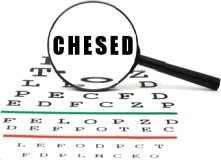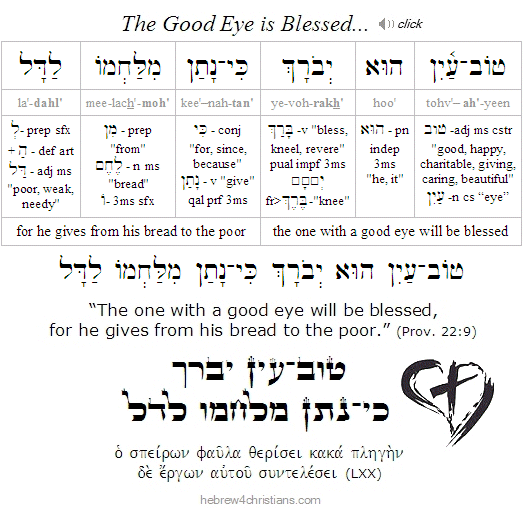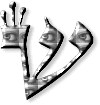|
The Danish philosopher Soren Kierkegaard (1813-1855) told the story of two young portrait artists who both sought to capture the essence of beauty in their paintings. One artist looked high and low for the "perfect face of beauty" but never found it. Tragically, he later gave up painting and lived in despair. The other artist, however, simply painted every face he saw and found beauty in each one. Now here's your question: Which of the two was the sincere artist?
The heart looks through the eye.... The good eye (i.e., ayin tovah: ūóųĘūÖų┤ū¤ ūśūĢų╣ūæųĖūö) - sometimes called the "beautiful eye" (ūóūÖū¤ ūÖūżūö) - refuses to think evil about others (it "does not impute the bad" - ╬┐ßĮÉ ╬╗╬┐╬│ßĮĘ╬Č╬ĄŽä╬▒╬╣ ŽäßĮĖ ╬║╬▒╬║ßĮ╣╬Į - in 1 Cor. 13:5), but it rejoices in the truth ŌĆō even if such truth is found only in the hope of a future good (1 Cor. 13:7). The good eye is the instrument of a giving heart that looks upon the needs and pains of others with genuine compassion. The "evil eye" (i.e., ayin hara: ūóųĘūÖų┤ū¤ ū©ųĖūóųĖūö), on the other hand, is cynical, jaded, envious, and unsympathetic to other people and their struggles... Using a good eye takes from the treasure within the heart and gives it out freely to others: "The good person out of his good treasure brings forth good, and the evil person out of his evil treasure brings forth evil" (Matt. 12:35). There never is a risk that love may be given away without warrant from heaven. In the future judgment to come, I'd rather be found guilty of "casting pearls before swine" than to be found guilty of withholding love from others...
A person with a "good eye" looks at things from the perspective of love. Ayin tovah looks at circumstances -- and especially at other people -- and finds something beautiful.... "Whoever sows sparingly will also reap sparingly, and whoever sows bountifully will also reap bountifully" (2 Cor. 9:6). As we give, so we are given...
ūśūĢų╣ūæųŠūóųĘūÖų┤ū¤ ūöūĢų╝ūÉ ūÖų░ūæū©ųĖūÜų░
ūøų╝ų┤ūÖųŠūĀųĖū¬ųĘū¤ ū×ų┤ū£ų╝ųĘūŚų░ū×ūĢų╣ ū£ųĘūōų╝ųĖū£
tov-a'┬Ęyeen ┬Ę hoo ┬Ę ye┬Ęvo┬Ęrakh
kee-na┬Ętan ┬Ę mee┬Ęlach┬Ęmo ┬Ę la-dal

"The one with a good eye will be blessed,
for he gives from his bread to the poor."
(Prov. 22:9)

Hebrew Lesson
Proverbs 22:9 Hebrew reading (click):
 |
This verse is fitting for the holiday of Purim, since it is a mitzvah (blessing) to perform additional acts of kindness before the holiday begins. These acts of kindness include mishloach manot (ū×ų┤ū®ūüų░ū£ūĢų╣ūŚųĘ ū×ųĖūĀūĢų╣ū¬), the "sending of portions" to others (often anonymously), and mattanot la'evyonim (ū×ųĘū¬ų╝ųĖūĀūĢų╣ū¬ ū£ųĖūÉųČūæų░ūÖūĢų╣ūĀų┤ūÖūØ), the giving of gifts (tzedakah) to the poor. Like all other commandments, we see a great spiritual opportunity here: As it is written, "Tzedakah saves from death" (ū”ų░ūōųĖū¦ųĖūö ū¬ų╝ųĘū”ų╝ų┤ūÖū£ ū×ų┤ū×ų╝ųĖūĢųČū¬).
Yeshua told us, "The eye is the lamp of the body. So, if your eye is good (i.e., ß╝üŽĆ╬╗╬┐ß┐”Žé, sincere, heartfelt, compassionate), then your whole body will be full of light, but if your eye is evil (i.e., ŽĆ╬┐╬Į╬ĘŽüßĮĖŽé, wicked, malicious, ungracious), your whole body will be full of darkness. If then the light in you is darkness, how great is the darkness" (Matt. 6:22-23). May it please God to make each of us shocher tov (ū®ūüūŚųĄū© ūśūĢų╣ūæ), "a seeker of good." May He give us new hearts to behold the good in all things...
|



